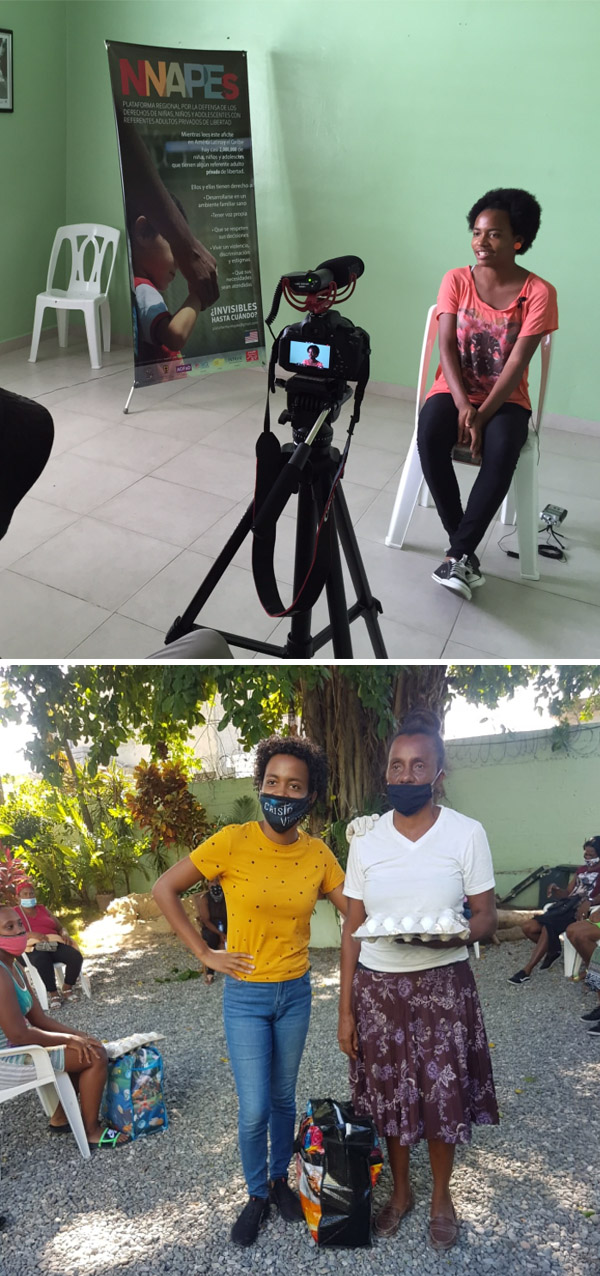Stories of Change

Top: Felicia in 2015, being interviewed for a documentary about children with incarcerated parents. Bottom: Felicia in 2020, responding to the coronavirus pandemic in the Dominican Republic as a staff member of Caminante. Bottom photo courtesy Caminante.
On International Day of the Girl, Wisdom from a Role Model
Felicia is a longtime friend of CWS from the Dominican Republic. CWS supports regional advocacy and support of children whose parents are incarcerated. Felicia participated in programs through our partner in the Dominican Republic, Caminante Proyecto Educativo. She has shared her own experience as the child of an incarcerated parent with international audiences and has helped bring attention to an issue that affects millions of children. Today, she is on the staff at Caminante. Our team chatted with Felicia in honor of International Day of the Girl, which is on Oct. 11. Here’s what she had to say:
1. How did you first hear about CWS and Plataforma NNAPES, the regional advocacy platform for children with incarcerated parents?
In 2015, I had the honor of getting to know the work of the NNAPES platform and CWS in the Dominican Republic. It was there that I met Luciano Cadoni, who was one of the people who invited me to the interview that changed my life. I say it changed my life because it was the first time that an adult approached me and my family to ask us how we were, how we felt and what it was like for us to have a father deprived of liberty. It was the moment I was able to breathe, express myself, know who I was and start changing my life in a wonderful way.
2. What types of activities did you participate in through Caminante?
I have participated in several activities through Caminante, many of which have been supported by CWS. I have participated in camps for children and adolescents, I have been in the young alert project, which is a project that has enriched me a lot. I have led many activities for children and youth, guiding them on what their rights are. Through these programs, they were given help and support, and I’m trying to move forward with them.
3. How has Caminante changed your life?
Caminante changed my life in a very wonderful way from the beginning, since I came in as a program participant. That’s when I learned for myself what NNAPEs is, and today I’m a cultural educator as part of the NNAPEs project here in the Dominican Republic. It fills me with pride and makes me feel good because I know children and adolescents who are going through the situation that I went through, and I can give them my support. I can give them advice, work with them and learn a little more every day. That makes me feel really good.
4. What is the most rewarding part of working for Caminante?
The most rewarding thing for me is to be able to support so many children and adolescents who, in turn, support me. I also really like to gain experience on these topics. It’s nice to go home for the day and know that I worked with 31 families with children and teenagers with parents deprived of their liberty. I was able to help them, I was able to advise them, I was able to arrange an appointment with the counselor. Being able to visit them and know that they are okay are things that make me feel good and make me grateful. And I’m grateful to God, to the NNAPEs project and to CWS because they changed my life forever.
5. What is something that you think more people should know about what it’s like to be a child whose parent is in prison?
I think that more and more people should know about children and adolescents who have adult references deprived of their liberty. Adults often judge children because their parents have made a mistake, and that doesn’t feel right. That’s why I think everyone should know how the NNAPEs project changes lives, as it helps children, children and teenagers to get ahead. CWS helps many children from different countries who are in this situation. I think the NNAPEs project changes lives.
6. October 11 is International Day of the Girl. What advice would you give to another young girl whose father is in prison in the Dominican Republic?
My advice to all children and adolescents with parents deprived of liberty is to fight for your dreams, to try to get ahead and never shut up. If you want to express what you feel, do it. Your father and your mother are always going to be there to support you and listen to you. No parent wants to do anything wrong for their children. Parents always fight so that we have the best and have a good education. I want them to try to focus on the positive and not so much on the negative and understand that our parents, wherever they are, are always accompanying us.
